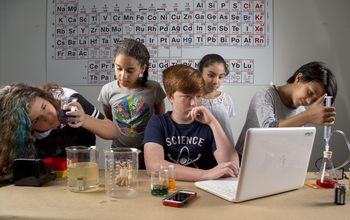News Release 18-105
NSF awards $50M in grants to improve STEM education
Awards focus on students and teachers in 24 US states and the US Virgin Islands

FY2018 awards aim to result in research-informed and field-tested classroom products and outcomes.
November 15, 2018
This material is available primarily for archival purposes. Telephone numbers or other contact information may be out of date; please see current contact information at media contacts.
With the 2018-2019 school year underway, K-12 students have new opportunities for learning. Science, technology, engineering and mathematics (STEM) teachers also have new prospects to sharpen their skills and innovate in their classrooms.
The National Science Foundation's (NSF) Discovery Research PreK-12 (DRK-12) program aims to help students and teachers accomplish all of the above. In Fiscal Year (FY) 2018, DRK-12 issued 59 new awards to institutions in 24 states and the U.S. Virgin Islands totaling more than $50 million. NSF program managers anticipate the awards will result in classroom products and outcomes that have been field-tested and informed by research to strengthen teaching, learning and assessment.
The DRK-12 program funds applied research and development activities that support teachers and students in enhancing their understanding and use of STEM content, practices and skills in the classroom. Included in FY 2018 are two Faculty Early Career Development Program awards given to support early-career faculty who have the potential to serve as academic role models in research and education. In addition, the program issued one award to study the impact of hurricanes and school responses on students.
"We are delighted to support these education research and development efforts across the nation," said Evan Heit, division director for Research on Learning in NSF's Education and Human Resources Directorate. "Advancing the DRK-12 program's work in all areas of STEM learning and teaching, in pre-K through grade12 settings, is a vital component of our goal to seek excellence in STEM education."
Below is a sample of DRK-12 projects NSF funded in FY 2018.
- Enhancing Teacher and Student Understanding of Engineering in K-5 Bilingual Programs, Idalis Villanueva, Utah State University
- This mixed-method exploratory study will examine how bilingual teachers working in elementary schools in Massachusetts and Puerto Rico understand the role and skills of engineers in society.
- RAPID: Investigating the Impact of Hurricanes and School Responses on Students in Texas and North Carolina, Cassandra Davis, University of North Carolina at Chapel Hill
- This Rapid Response Research project aims to collect data across diverse school districts with varied degrees of impacts from Hurricane Harvey in August 2017 and Hurricane Matthew in October 2016. It will provide understanding of current strategies employed by schools for disaster recovery and their effectiveness.
- CAREER: Mechanisms Underlying the Relation between Mathematical Language and Mathematical Knowledge, David Purpura, Purdue University
- This Faculty Early Career Development (CAREER) project will examine the process by which math language instruction improves learning of mathematics skills in order to design and translate the most effective interventions into practical classroom instruction.
For the complete list of projects and their summaries, see NSF's award search database.
-NSF-
Media Contacts
Bobbie Mixon, NSF, (703) 292-8070, email: bmixon@nsf.gov
The U.S. National Science Foundation propels the nation forward by advancing fundamental research in all fields of science and engineering. NSF supports research and people by providing facilities, instruments and funding to support their ingenuity and sustain the U.S. as a global leader in research and innovation. With a fiscal year 2023 budget of $9.5 billion, NSF funds reach all 50 states through grants to nearly 2,000 colleges, universities and institutions. Each year, NSF receives more than 40,000 competitive proposals and makes about 11,000 new awards. Those awards include support for cooperative research with industry, Arctic and Antarctic research and operations, and U.S. participation in international scientific efforts.
Connect with us online
NSF website: nsf.gov
NSF News: nsf.gov/news
For News Media: nsf.gov/news/newsroom
Statistics: nsf.gov/statistics/
Awards database: nsf.gov/awardsearch/
Follow us on social
Twitter: twitter.com/NSF
Facebook: facebook.com/US.NSF
Instagram: instagram.com/nsfgov
